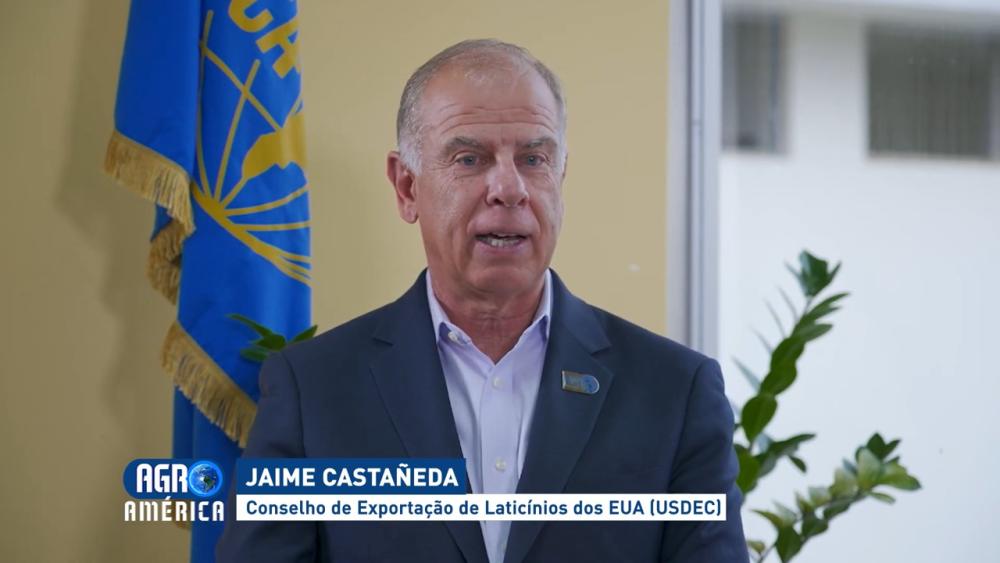Jaime Castañeda, representative of the U.S. productive and industrial sector, explains progress in environmental sustainability of dairy farming on the continent

San Jose, 16 November 2023 (IICA) – Dairy products in the Americas have made significant strides in recent years both in terms of environmental sustainability and animal welfare, claims Jaime Castañeda, who represents the dairy industry of the United States — a global leader in exports.
Castañeda visited the headquarters of the Inter-American Institute for Cooperation on Agriculture in Costa Rica, where he was interviewed by AgroAmerica, a program broadcast on Brazil’s Agro+ television channel.
During the conversation, he explained in detail how the United States dairy industry has incorporated innovation and technology to become more efficient and to reduce greenhouse gas emissions, the leading cause of climate change. He also assured that producers have become more aware that cow welfare generates positive results in terms of production.
Castañeda is Executive Vice President for Policy Development & Strategy at both the U.S. Dairy Export Council (USDEC) and the National Milk Producers Federation (NMPF). In his 35 years of experience in agricultural policy, he has held several positions in the public and private sectors and is a regular point man for the U.S. government on food production regulatory issues and trade negotiations.
“The United States is the largest producer of cow’s milk in the world, not including buffalo from India. We are also the largest exporter of cheese in the world and a top exporter of dairy products in general. Many are surprised by the scale of our milk production, because we only started to export seriously 24 years ago. Prior to 1999, Europe was the only continent to export milk for centuries. Today, the United States exports around 18% of total production, because there is also a large internal market. We have large, medium and small-scale producers and different types of production, which make us the most efficient. We cover everything”, he explained.
The U.S. dairy industry began to concern itself with the environmental sustainability of its activity many years ago when virtually no one else in the world was doing so, said Castañeda.
He believes that while in Europe there is a current of opinion that favors reducing the number of animals intended for food production to combat climate change, in the United States the imperative is to improve animal productivity in order to reduce greenhouse gas emissions while making more food available.
“There is a false narrative in Europe surrounding animal production that is upheld by extremist organizations, which is very detrimental to the interests of the Americas, and especially Latin America. We believe it isn’t necessary to reduce the number of cows, but rather to increase productivity, to ensure there is more animal protein available with fewer emissions. It’s very simple for someone living in a rich European country to want to reduce the consumption of animal protein, but there are many hungry people in the world and what we need is more production, more farmers, not less”.
In this regard, he explained that technology and innovation are making an important contribution to reducing emissions from production. One example are the biodigesters already in operation in many dairy farms in the United States and other countries of the Americas, which produce energy from cow manure and reduce methane emissions.
He also explained that other activities, such as the burning of fuels in land and air transportation, are much more damaging in terms of climate change than agriculture.
Availability of new technologies
Castañeda highlighted the role played by IICA in defending the interests of the agricultural sector and the countries of the region in international forums as well as its work to disseminate new technologies. “Not only should rich countries have access to innovation and knowledge. New technologies must be shared and reach all producers”, he said.
Castañeda also referred to the progress being made in terms of animal welfare: “Those who don’t know would be surprised at how productive and happy our cows are. Basically, they eat when they want, rest when they want and live in a nice place, they are always protected. This has increased their productivity.”
Lastly, Castañeda spoke of the reality of agricultural production in the United States and across the continent, which is very different today.
“Today, everything has changed and farming is very difficult. The work is hard and we have less farmers, since our population is aging and young people often don’t want to stay on the farm. While many farmers feel an attachment to the land, if they want to be profitable, they have to become not only a farmer but also a businessperson, because across the supply chain everyone is trying to make money. That is why it is so important for governments to strengthen farmers, to guarantee resources and to ensure that education and opportunities for progress are available to everyone”.
AgroAmérica is a program broadcast by the Brazilian TV channel Agro+, owned by the Bandeirantes Communication Group and produced in partnership with the Inter-American Institute for Cooperation on Agriculture (IICA). The program covers current affairs in the agriculture and rural sectors of IICA member countries to promote the sharing of experiences and a discussion on challenges and opportunities in Latin America and the Caribbean in the area of agricultural and rural development.
More information:
Institutional Communication Division.
comunicacion.institucional@iica.int